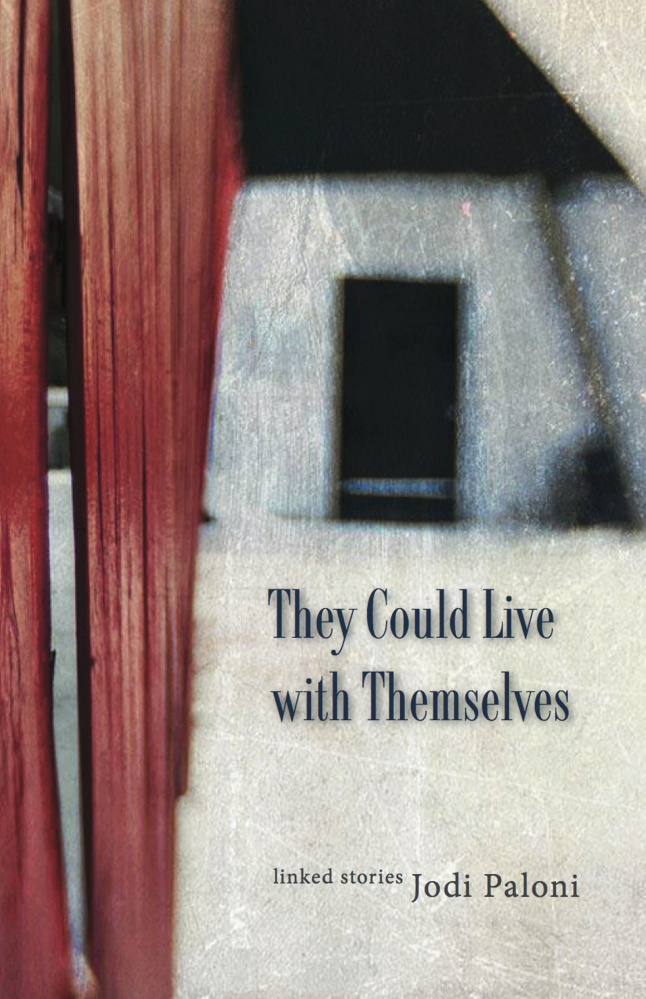There is a powerfully arresting line near the end of Jodi Paloni’s collection of linked stories, “They Could Live with Themselves,” that, when you come to it, you simply cannot push past it.
It is in the story of Charlotte Cook, a young girl who fears that her mother won’t be home for her 12th birthday. Her mother is away being treated for addiction. Charlotte goes out the back door of the house, but skirts the line of crows that always perch on the fence above the trash can. “I hate them,” she thinks. “They want and they want.”
That line rises like the report of a tolling bell, declaring what lies at the heart of all 11 stories in the author’s deeply affecting debut book. The line’s sparse eloquence, naked as a heartbeat, lays bare the yearning of the dozen or so main characters, each with their own regrets and losses, yet striving still to reconcile their lives to the circumstances they find themselves in.
“They Could Live With Themselves” is as much a story about place as it is about the characters who live there. Stark Run is a Vermont community, a small town in its nature, and though Paloni enables the reader to richly experience the place, she provides little physical description to define it. The reader discovers the soul of the place through the struggles that hold and shape the daily lives of those who live there.
It is akin to Sherwood Anderson’s “Winesburg, Ohio,” providing readers with voyeur-like glimpses into the often-crushing weight of individual events and decisions that, in many cases, happened long ago but still haunt people’s lives.
All ages and stages of life and love are included, from 11-year-old Charlotte in “Mabel, Mabel,” to Maeve Bellamy in “Ms. Bellamy,” the 69-year spinster English teacher at the high school who still lives at home with her mother.
Yes, they can live with themselves, but it is never easy.
In “Deep End,” Jillanna is at the pool when her little brother Elliot goes under unnoticed and drowns. She blames herself for distracting the lifeguard, but carries her guilt stoically until, at a gathering of women around her mother in their living room, she blurts out, “It was not my fault.”
After the women have left, “her mother turned – one quick motion – and slapped Jillanna across the face with a flat hand.
“Jillanna’s cheek stung. She realized that they were the only two in the room.”
Paloni packs the weight of a small novel into this single story.
“Wonder Woman” is the story of a lonely girl who gets caught in a mismatched friendship of hate, envy, attraction, betrayal, redemption and desire with a popular girl in town. “Accommodations” tells of a woman seeking to break free of the interior “story” she repeatedly tells herself about what kind of person she is.
“The Third Element” focuses on Meredith Wade, an elementary art schoolteacher who appears in several other stories. She had gone off to live the bohemian life of an artist in Philadelphia but returned to care for her ailing mother. She now lives alone in the house she grew up in.
The static routine of her existence is altered when Sky Ryan, one of her former students, talks his way into painting her house and working in her yard. While he works, she secretly sketches him.
“Drawing him feels like summer should, no stress, no thick dull strain of grief inside her chest.” Later, in the privacy of her studio behind the house, she works on an assemblage of objects, “replicating a woman’s body before disease took the whole thing.” It is an expression of her secret wanting to be whole as well. “As a teenager, she could hardly stand to be near her mother for more than a few hours, but now an absence fills her chest cavity in spurts, like buckshot, leaving tiny spaces for hot and cold to seep in and send her into hiding.”
The last story, “The Physics of Light,” brings Sky Ryan and Meredith Wade together again. She had encouraged him to take photography at the local community college. Late one night, he slips from his girlfriend Emily’s bed and goes to see Meredith, seeking counsel on the photos he’s selected for a one-man show. “He wants to do a series, tell a story, twelve images starting with Emily half-clothed on the rocks, then asleep in her bed.… He’d place an image of the vacant riverbed at the end. The audience could interpret the linear progression however they wanted based on their personal view of the world – beauty, love, nature, loss.… (He’d) invite his audience to feel.”
Meredith assesses the 12, then while he is out on the porch, looks at all the photos in his portfolio. Realizing that he’s holding back, yet wanting to break free, she tells him, ” ‘You know there’s something more you have to do in this project, something more difficult.’ ” She asserts that he knows what it is, then presses him to identify it. “He closes his eyes.… ‘The honesty,’ ” he says.
” ‘Yes.’ Meredith spins around. ‘They’re all about the dream, the desire.’ ”
She encourages him to shoot more that night in her studio. It is a transformative interlude for the both of them. Ultimately, he “pisses off more than a few people” with his show. There is nothing left for him to do afterwards but what Meredith encourages him to do.
” ‘So now you need to get out of here and become a Stark Run legend.’ ”
Paloni, who lives in Maine, has a natural ease in her storytelling and an unsentimental yet compassionate depth of understanding of human foibles and desires. She also possesses the honesty not to unnecessarily gloss them, allowing them to faultlessly blend together, inviting her readers to feel.
She is masterful in her craft but also leaves readers to, as Sky suggests, “interpret the linear progression” of her stories however they want “based on their personal view of the world – beauty, love, nature, loss.”
Frank O Smith is a Maine writer whose novel “Dream Singer” was named a Notable Book of the Year in Literary Fiction in 2014 by Shelf Unbound, an international review magazine. “Dream Singer” was also a finalist for the Bellwether Prize, created by novelist Barbara Kingsolver “in support of a literature of social change.” Smith can be reached via:
frankosmithstories.com
Send questions/comments to the editors.




Comments are no longer available on this story